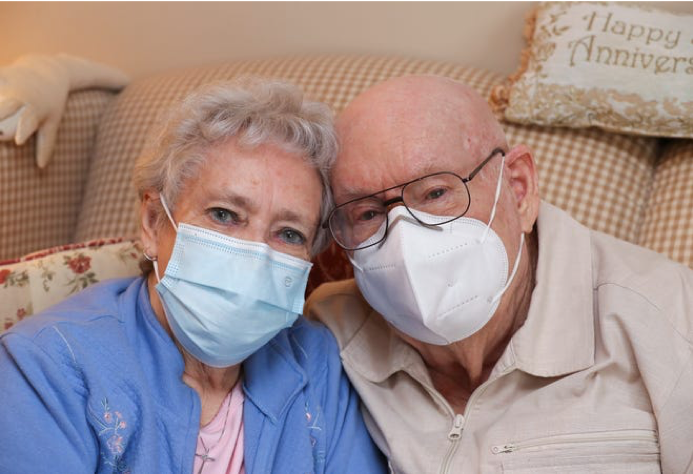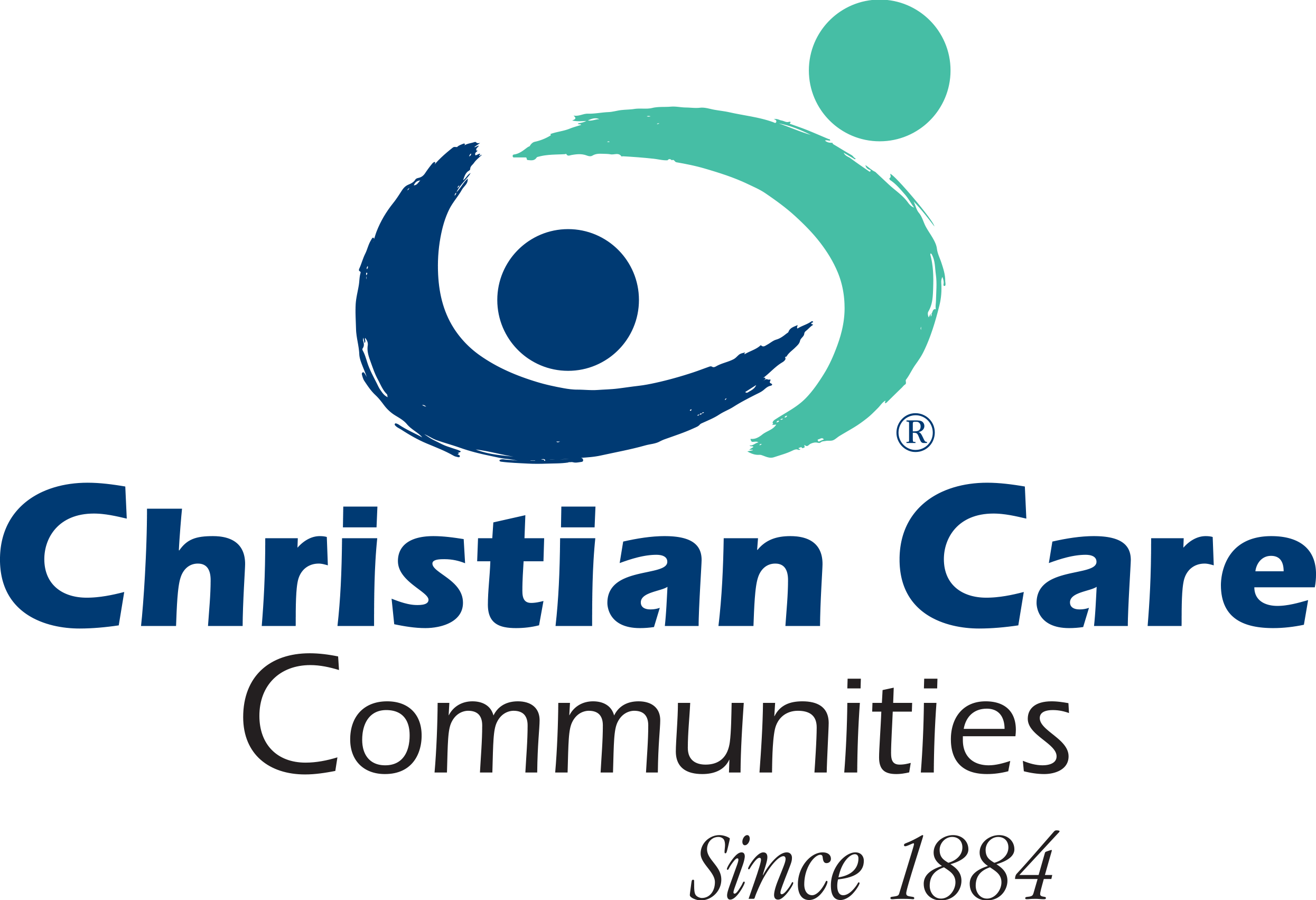Louisville Courier Journal
Published January 22, 2021
Don Hall, 88, right, and Patsy Hall, 89, in their senior living residence at the Chapel House in Louisville, Ky. On Jan. 21, 2021. Don has already received his first dose of the Covid-19 vaccine and Patsy will receive her first dose soon.

LOUISVILLE, Ky. — When first offered the new COVID-19 vaccination, Valerie Geralds, a nurse at T. J. Samson Community Hospital in Glasgow, turned it down.
“I wanted to wait, just to see how it affected everyone else,” said Geralds, 42, director of women and newborn services.
But she quickly reconsidered.
“It was just like a light bulb for me,” said Geralds, who received her second dose of the two-shot vaccine Wednesday. “I thought, ‘What am I doing? I trust science.'”
Six weeks after the arrival of the first doses of vaccine in Kentucky, wariness is being replaced by growing interest from more health care workers — among those first designated for limited supplies of vaccine.
Geralds said she’s noticed the change among her co-workers who skipped the first chance to get the vaccine.
“I knew some that were dead set against it and now they have called and made their first appointment and they’re also calling to get their parents an appointment,” she said.
At the state’s nursing homes, only about 40% of workers accepted the first round of vaccines in late December. But more workers are now signing up and taking the vaccine — likely because they are learning more about it and seeing their co-workers safely vaccinated, said Eric Friedlander, secretary of the state Cabinet for Health and Family Services.
Friedlander estimates 65% of nursing home workers are taking the vaccination and expects that percentage will continue to increase.
“We’re seeing a lot better uptake,” Friedlander said.
Meanwhile, most nursing home residents have opted for the vaccine, with more than 90% accepting it, he said.
Hospitals say participation rates by workers varies and is tied to the limited doses of vaccine they receive.
For example, at T.J. Samson Regional Health, which operates hospitals in Glasgow and Columbia, about 40% of staff accepted the offer of the first allocation of doses, said Stacey Biggs, executive vice president of marketing.
The hospital system, which also is helping vaccinate others in the community, such as other health workers and school personnel, has exhausted its supply of vaccine and expects much more interest among its employees as soon as it can get more doses, Biggs said.
“I expect that over time, that the numbers will increase and that more people will decide to go ahead and get it,” she said.
Demand also is greater than the supply in the Bowling Green region, where Med Center Health has been vaccinating workers at its five hospitals, as well as others in the community, said Dr. William Moss, an emergency room physician.
“The demand has been huge,” Moss said. “We need more vaccine.”
For now, as limited supplies of vaccine trickle into Kentucky through federal allocations, the larger problem is having enough supply to meet the demand — especially from people 65 or older who are at greatest risk from COVID-19, public health officials say.
“Those individuals really want the vaccine,” said Sara Jo Best, president of the Kentucky Health Departments Association. “And, unfortunately, supply has not met the demand.”
In Louisville, three hospital systems that had begun offering vaccines to people 70 or older were forced to suspend taking new appointments after they were inundated with requests by phone and online.
Gov. Andy Beshear said Tuesday he will ask the federal government to increase doses but for now is seeing fewer allocated to Kentucky rather than more. He said Thursday he’s awaiting a response from the new administration of President Joe Biden and was encouraged by the president’s comments Thursday that he wants to ramp up supplies to states.
In Louisville, Patsy Hall, 89, was happy to learn she was to get the vaccine Friday after it was expanded to residents in Chapel House, a senior living complex in Louisville operated by Christian Care Communities where nursing home residents already have been vaccinated.
“Most of us at Chapel House are anxiously waiting for it,” said Hall, who lives with her husband, Don Hall, in an apartment at the complex. “I think the vaccine will help tremendously.”
Don Hall, 88, recently got the vaccine through the Veterans Administration, and the two are urging their fellow residents to get vaccinated as soon as possible, Patsy Hall said.

The initial doses of vaccine are designated for health workers and nursing home residents and staff, followed by emergency responders, public school employees and people 70 or older.
“We have more people wanting it and we’re seeing less supply,” said Best, director of the Lincoln Trail District Health Department. “As time goes on, I think attitudes are changing.”
At the state’s 285 nursing homes, while fewer than half of employees signed up for the first round of doses offered in late December, that changed as more signed up for the second round several weeks later.
Friedlander expects that to increase as pharmacy chains CVS and Walgreens continue to administer doses at those facilities under contract to the federal government. The pharmacy chains will visit each facility at least three times to offer vaccines to staff and residents, he said.
The two vaccines approved for use require two injections several weeks apart.
At hospitals, rates of staff taking the vaccine vary, but officials say that’s largely because of limited supply.
At University of Louisville Health, around 8,100 employees have received at least a first dose of vaccine, about 70% of those eligible, a spokeswoman said.
At Norton Healthcare, 10,300 employees, or about 61% of employees, have been vaccinated, with the hospital system adding appointments as more vaccine becomes available, it said.
At nursing homes, which house about 27,000 Kentuckians, administrators think the acceptance rate is above 90% because that population has suffered the most from COVID-19, accounting for about two-thirds of Kentucky’s more than 3,300 deaths from the virus that has infected around 335,000 people.
“We have a very high acceptance rate among our residents,” said Mary Lynn Spalding, CEO of Christian Care Communities, which operates 10 nursing homes or other senior living communities in Kentucky.
Nearly all of its nursing home residents have taken the vaccine, she said.
Christian Care staff also believe residents are tired of restrictions on visits that began after COVID-19 began to spread in Kentucky and want in-person contact with their friends and family instead of “window” visits and communication by phone or video chat.
“A lot of the seniors I interact with are very hopeful,” said Jim Patton, a spokesman for Christian Care. “They see this as one step closer to not being isolated from their families.”
Christian Care’s staff acceptance of the vaccine is lower, around 60%, Spalding said. But Christian Care, like other health facilities, is making it voluntary while working to encourage staff to get the vaccine.
Spalding said workers have cited concern about possible side effects from the vaccine, citing the speed with which it was developed.
Women of child-bearing age also are worried about whether it could affect their chances of getting pregnant or whether they should take the vaccine if pregnant. In those cases, Spalding said, workers are referred to the Centers for Disease Control and Prevention website which says pregnant women may choose to be vaccinated but should discuss it with a health care provider.
She said staff at all facilities are working to provide accurate information and stress the benefits of immunity from COVID-19.
“We have strongly encouraged it,” she said.
One group that needs little encouragement is the roughly 200 Christian Care workers who got COVID-19 and recovered. The vaccine is recommended for those who caught the virus because it’s not known whether they are immune or for how long.
“Many of the employees who got COVID definitely didn’t want it again,” said Sherry Maddox, a nurse coordinating care for workers who become ill.
At T.J. Samson, Geralds, the nurse who took the vaccine, said working with COVID-19 patients has convinced her of the need.
“I have seen patients with COVID,” she said. “It’s hard, and those patients get very sick.”
Geralds said she has no doubts about her decision to get vaccinated.
“I chose to do this not only for myself but my family, my friends, my patients, my co-workers, my community,” she said. “I’m very fortunate that this was offered.”
Reach Deborah Yetter at dyetter@courier-journal.com or 502-582-4228. Find her on Twitter at @d_yetter.
